You’ll get the 9 best keyword research tools in this list.
I’ve explained each tool in utmost detail.
Hence, even if you’re without much experience, you can understand the tools and this article with ease.
Table of Contents
1. SEMrush
Website: https://www.semrush.com/
I use nearly half a dozen SEO tools.
SEMrush was my first pick 6 years ago, and it’s my first pick today.
How many other tools do you know with 19 BILLION+ keywords in their database?
And, even if I’m biased, companies such as Amazon, eBay, Vodafone, Forbes etc. aren’t.
Well yes, they use SEMrush as well.
It allows searching for up to 100 keywords at once.
Anyway, a basic search will bring up this page:
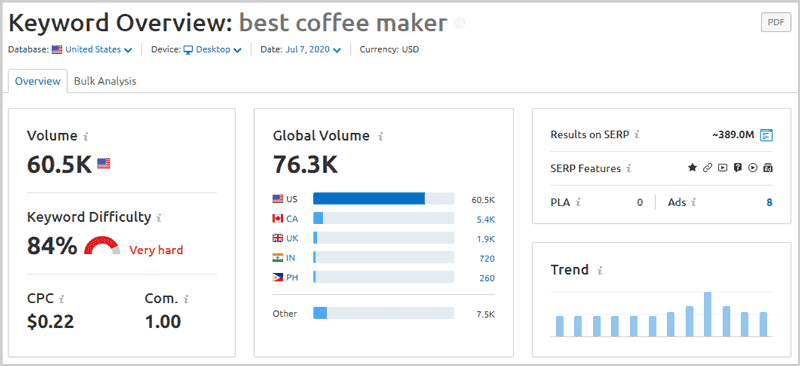
I’m sure most of it’s self-explanatory, isn’t it?
It shows me:
- The search-volume of the keyword.
- Keyword difficulty
- CPC
- Com. (this is the paid competition for the keyword).
- Global volume
- No. of results in SERP.
- The available SERP features for the keyword.
- No. of PLA (Product Listing Ads).
- No. of other ads.
But, Keyword research isn’t just “data for the keyword you already have”, is it?
It also means being able to get new keywords you can work on.
Well, SEMrush offers me three primary keyword-sets:
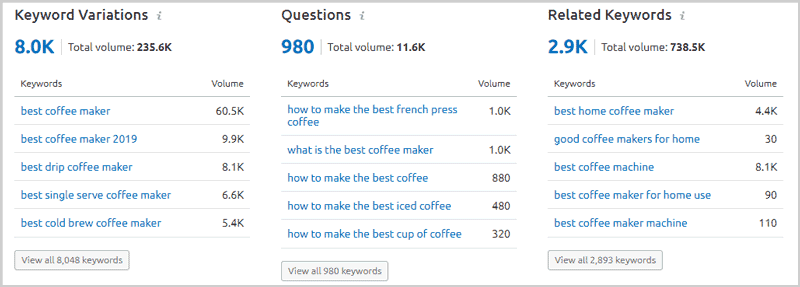
- Keyword variations (related / long-tail /similar keywords).
- Questions
- And Related keywords.
The total volume, for all these keywords combined is shown as well.
Scrolling down, I get the top 10 URLs for my keyword.

Notice how it shows me the number of keywords on the URL, and its search-traffic.
(This is perfect when I wish to know the actual traffic-potential on any given rank for any keyword).
Obviously other data such as backlinks, AS (Authority Score), RDs etc. is shown as well.
SEMrush Keyword Magic Tool
You simply enter a keyword, and you get millions (literally) of keywords you can work on.
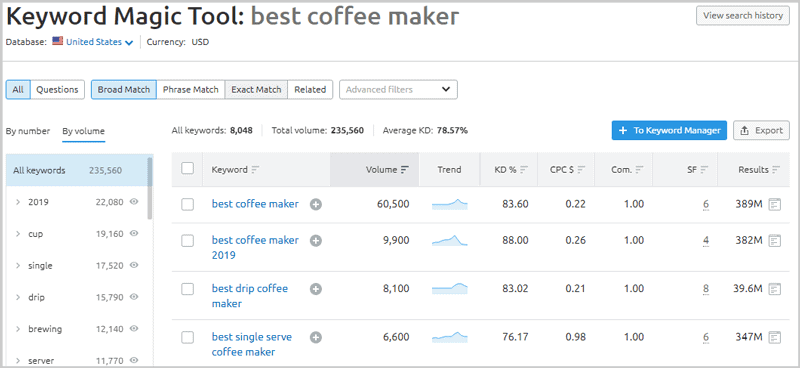
For each keyword, you get:
- Its volume
- A trend-graph (why work on dead keywords, eh?)
- KD (Difficulty)
- CPC
- Paid competition.
- SERP Features
- And no. of results.
It even offers advanced-filters you can use!

You can set ranges for word count, volume, difficulty, CPC, SERP features, no. of results etc.
Have specific requirements? These filters help you find exactly the keywords you need.
Keyword Gap
This without doubt is my personal favorite feature within SEMrush keyword research.
It tells me the keywords I don’t have, but my competitors do.
(I don’t believe in stealing, but just for the “research” maybe?)
So, I can add 4 competitors vs. my domain for the research.
Don’t know who your competitors are?
Doesn’t matter. Simply enter your domain. SEMrush auto-suggests your top-competitors!
And, here’s a result-page:
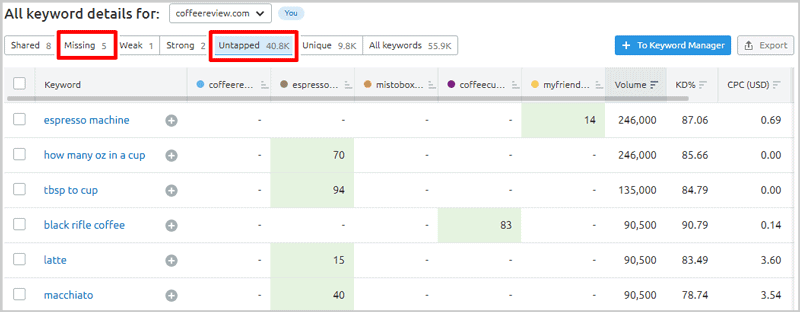
So, I can just click on the “missing” or “untapped” filters.
This will ignore the other keyword-groups (shared/ weak/strong etc).
It’ll only show me the keywords I most definitely do not have, or do not have rankings for.
Even though I do not use the other groups much, they offer me:
- Unique keywords: The ones only I have, and none of my competitors do.
- Shared keywords: Atleast one, or all of my competitors share with me.
- Strong: Where I rank higher than my competitors etc.
- Weak: I rank lower than my competitors.
Domain keyword list (Organic Research)
Need to extract/spy or steal (hey, I don’t judge) keywords from a domain?
Simply use SEMrush’s “Organic Research” feature.
Enter a domain, and you get a list of:
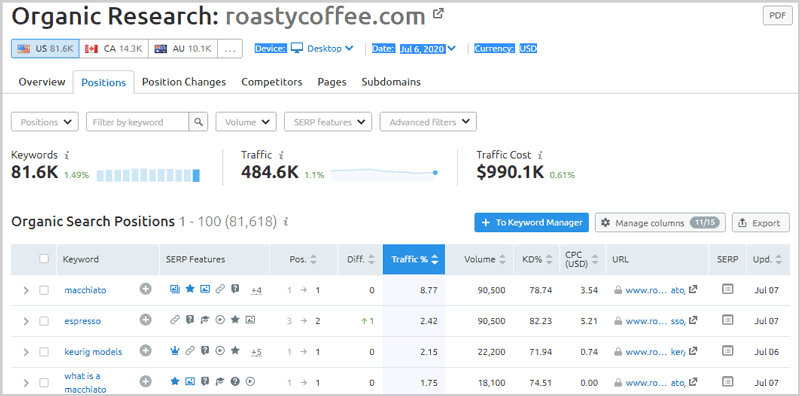
- Every single keyword the domain is ranking for.
- It’s visibility in the SERP features
- Position for each keyword.
- Traffic from the keyword.
- Search volume
- Difficulty
- CPC
- URL.
(Tell me that isn’t easy, or detailed, huh?)
CPC Map
It basically lets me select countries and regions.
And then, shows me keywords for that country.
The keywords include the following data for the region I’ve selected:
- Highest average CPC
- Lowest average CPC.
- Most expensive keywords.
- A list of industries based on CPC.
Starting a new Adsense project maybe? A pretty good place to start.
Ad-Data
Maybe you rely more on money than on SEO?
Well, SEMrush takes care of you as well.
It shows all the available:
- PLA Ads for the keyword.
- Other ad-copies.
- Keyword ad-history.
The Keyword ad-history can be expanded to get the full keyword list.
The report includes:
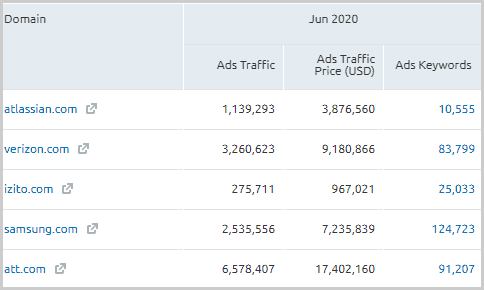
- The websites bidding for your keyword.
- Traffic being generated from the ads.
- Price paid for the ads.
- And all the ad keywords.
There’s another feature called “Advertising Research”.
Simply enter a domain in the search-field.
It’ll show you all the keywords the domain is running ads on.

The position, block, CPC, volume, traffic, traffic %, costs, etc. for each keyword is shown as well.
It basically can be used when you already have a competitor domain you wish to analyze.
Guess what, SEMrush offers more. A lot more.
Everything you can ever imagine, or need as far as SEO goes? It’s all there.
Hey, don’t trust me. Use SEMrush free trial yourselves and then see. Yes, It’s 100% free for 14 days.
2. Ahrefs
Website: https://ahrefs.com/
Aherfs initially started off as a backlink research tool.
However its “Keyword Explorer” is what’s of importance for this article.
(It offers me data I didn’t even think existed! Keep reading).
With 10.2 BILLION keywords in its database, I do think it’s worth a peek, isn’t it?
For starters, I get to choose from the following search engines:
- Amazon
- Bing
- Yahoo
- Yandex
- Youtube
- Baidu
- Naver
- Daum
- And Seznam
This list is pretty exclusive. No other keyword tool on this list offer as many options to choose from.
I enter a keyword, and here’s the result-page it provides me:
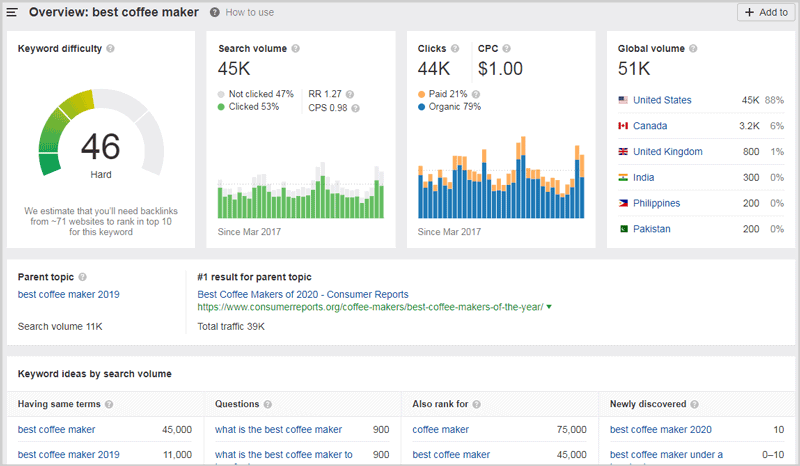
Do be patient, that’s a lot of data to shift through.
Well, it shows:
- Keyword Difficulty (KD)
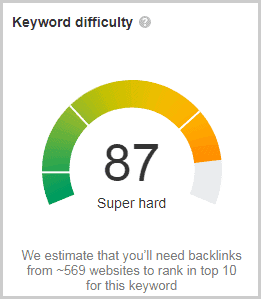
Most other tools just show a number. I don’t always understand the difficulty then.
But, Ahrefs also tells me the number of backlinks I’ll need to rank in the top 10.
In my experience, you’ll need a few more links than what Ahrefs says to rank for the keyword.
But hey, we both know backlinks are just one of the many ranking factors, right?
- Search volume
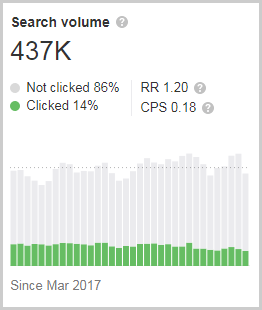
It’s the number of searches.
But wait, there’s a lot more.
It also shows the RR (Return rate). This is pretty unique.
It’s the number of times the same user, searches the keyword in a 30-day period.
It’s not exact, obviously.
But, let’s say you’re comparing a bunch of keywords. The keywords with higher RR clearly will be better, right?
Another feature is the CPS. It stands for “Clicks per Search”.
So, I get to know how many search results get clicked for each search on that keyword.
Notice that graph on the “search volume” tab? It breaks down the clicks vs. non-clicks for each month.
- Clicks and CPC
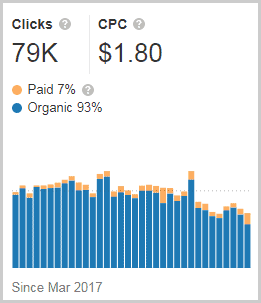
Talking of “exclusive” feature, the “clicks” is one.
It tells me the number of clicks my searched keyword gets in a month.
(Just because a keyword has good volume, doesn’t mean it has good CTR, right? This helps make profitable decisions).
And then the CPC!
If you’re building a site, or have a site with Adsense as your mode of monetization, this could be the most important metric for you, right?
- Global volume
Breaks the search-volume down based on the different countries.
Helps with geo-targeting as well as understanding your audience (and their behaviour) better.
- Other actionable data.
If I scroll down on the page, Ahrefs shows me the traffic that the #1 result for my keyword gets.
Then, it gets me a bunch of other keyword ideas, categorized into:
- Having same terms: these are similar keywords.
- Questions
- Also rank for: the top 10 results also rank for these additional keywords.
- Newly discovered.
In a nutshell, it shows me additional keywords I can target.
And that’s not all.
It also offers an overview for the top 10 results for my keyword.
This includes:
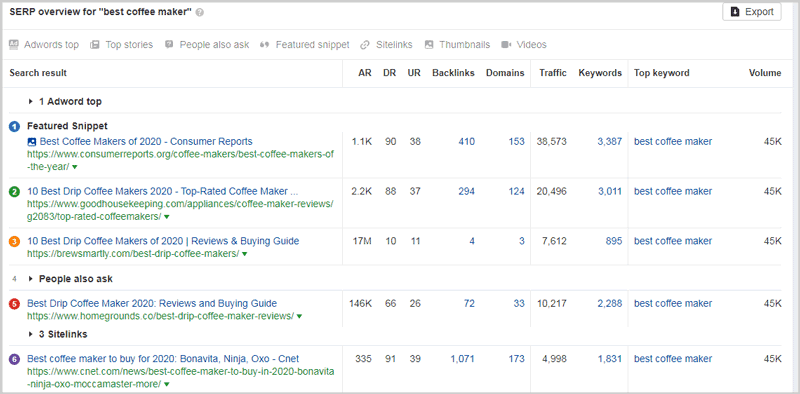
- AR (Ahrefs Rank): Strength of the “backlinks profile”.
- DR (Domain Rank): Same as AR, but on a 100-point scale.
- UR (URL Rank): The strength of a specific URL’s backlink profile.
- No. of backlinks.
- No. of domains (Referring domains).
- Traffic
- Keywords on the domain.
- And the top-keyword.
(Most of these metrics can be clicked to get in-depth data regarding the data, e.g. backlinks/domains etc.)
This also gets me a pretty good idea of the existing competition and the efforts required to outrank them.
If I click on the “keywords” link, it shows the following data for each domain:
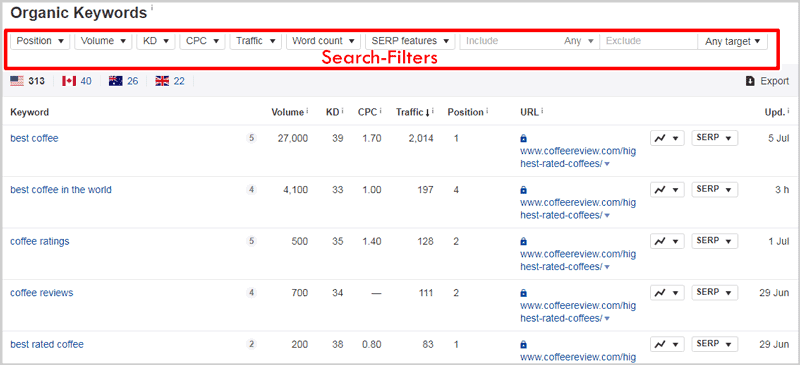
- The volume
- KD (difficulty).
- CPC
- Traffic received from that specific keyword.
- Position
- And the SERP features.
Notice those filters in the screenshot above?
I can filter the exact keywords I wish to see on this list.
Two other data-sets worth mentioning are its :
- Traffic share by domain
- Traffic share by page.
This basically is a list of “traffic”.
For any entered keyword, Ahrefs shows me the all the domains receiving traffic from my keyword.
The exact traffic, and % of traffic out of the total traffic is mentioned.
Basically, it helps understand the traffic-potential for each position on the search-results.
It also has this “Keyword list” you can add your keywords to for better management. (This isn’t as well-organized as SEMrush, no “total searches/volume” shown).
Content Gap
Alike SEMrush, Ahrefs too has this “content gap” feature. It’s basically a competitor analysis tool, targeted at keywords.
I get to add 10 competitors and 1 domain of my own.
The tool will show me the keywords the competing domains (at least one of them) is ranking for, but my domain isn’t.
Here’s what the results look like:
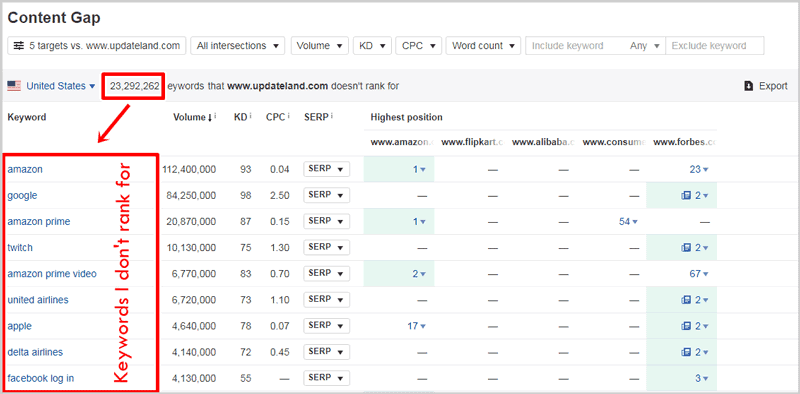
Let’s break it down? It gets me:
- No. of keywords my domain doesn’t rank for.
- The exact keywords I don’t rank for.
- Volume / KD/ CPC and SERP features.
- Position of the competing domains for the keyword.
Paid Keywords
Well yes, Ahrefs also allows you to research, and spy on a competing domain’s paid keywords!
There’s this “PPC Keywords” feature on the left-sidebar.
Simply enter the domain, and you’ll get something like this:
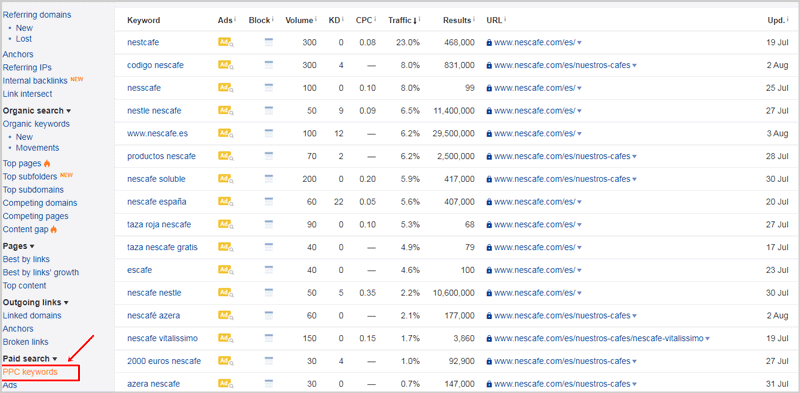
The data includes the ad-block (position), volume, KD, CPC, traffic, no. of results and landing page URL.
You can get less-detailed paid keyword data by clicking on the “Paid Search” feature on the Site Explorer page.
All in all? If you aren’t going with SEMrush, there truly isn’t a better keyword research tool than Ahrefs.
3. Serpstat
Website: https://serpstat.com/
If you need competitive, comparative keyword data, Serpstat will be your new best friend.
Serpstat gets you data from Google and Yandex.
Here’s a standard keyword search-result page:
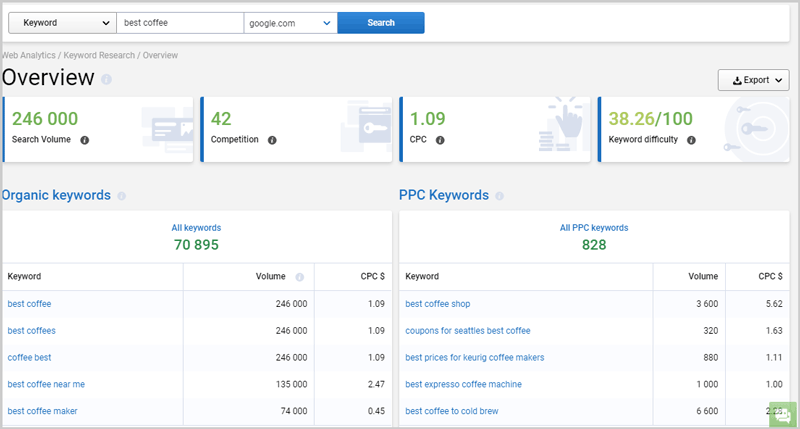
For starters, it includes:
- The search volume
- Competition*
- CPC
- And Keyword difficulty.
*The “competition” metric is showing the competition for PPC ads and not for organic rankings. The “Keyword Difficulty” metric shows the organic ranking difficulty.
At a glance? The basics are all there.
Then there are “Organic keywords”.
These are all the keywords that are related to your keyword, and currently are ranking in Google’s top 100 results.
“PPC Keywords” shows you the keywords on which ads are being run.
Scrolling down, you’ll get more domain-specific data.

It shows:
- Total no. of domains with your searched keyword in their title.
- No. of pages with the keyword in their title.
- The top 10 ranking domains.
- Serpstat Trust Rank : Based on the quality of the backlinks.
- Serpstat Page Rank: The same as Trust Rank, but for individual URLs.
- No. of backlinks.
- Referring domains.
Further down, it’ll show you a list of “Organic Competitors” based on the entered keyword.
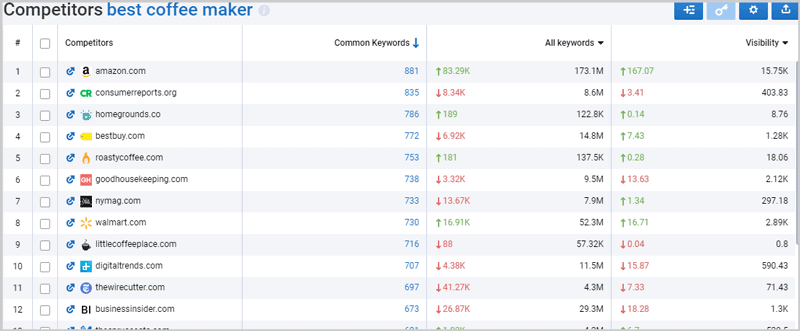
It shows all the domains which are competing and ranking for your keyword.
The displayed data includes the number of common/shared keywords, all keywords (even outside your keyword), and visibility.
You can also enter your competitors manually if you wish to check how many keywords you share with them.
There’s another tool/feature that Serpstat offers- “Keyword selection”.
You can enter your keywords, and it shows you a long list of related keywords, with the following data:
- Difficulty
- Search volume
- CPC
- Paid competition.
- Results
- And social domains (ecommerce sites/social media/ authoritative domains).
Another similar tool it offers is named “Related Keywords”.
Well yes, it too shows you the related keywords for your domain.
It shows:
- SERP features.
- Search volume
- CPC
- Paid competition
- And Connection strength*
*It shows the no. of identical URLs in the top-20 results for the searched keyword.
And then finally, the “Search Suggestions” feature lists hundreds of “question keywords”.
These can be used to acquire SERP features on Google, or just make your content better.
I must say, the search-filters Serpstat offers are the most impressive.
It offer boolean filters.
Meaning, you can add “and/or” variables to your search. (E.g. keywords which have 20 difficulty AND 5000 search volume, AND $2.00 CPC).
But if I’m being honest? The interface isn’t as simple as SEMrush or Ahrefs.
But, as far as pure data goes, that’s still impressive.
4. Moz
Website: https://www.moz.com
Moz was one of the first free keyword research tools I used in my early days.
As of today, it’s one of the most data and feature-rich SEO suits out there.
Let’s start with the basics?
Here’s a result-page:
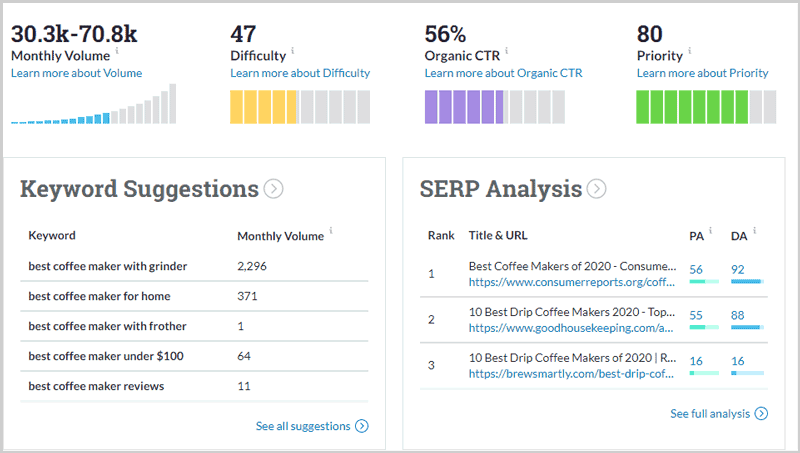
The data includes:
- Monthly search-volume.
- Difficulty
- CTR
- Priority
Unlike other best free keyword research tools, Moz doesn’t display absolute numbers.
Rather, it shows a minimum-maximum range. The search volume is supposed to be within these brackets.
The CTR displays the % of clicks search results are expected to get.
The “Priority” is an unique Moz metric. It takes into account the volume, CTR, and difficulty.
Basically any keyword with a higher priority has good search volume, lesser difficulty and good CTR.
Then, there are the Keyword Suggestions, followed by a SERP Analysis table.
The SERP analysis is a personal favourite and pretty informative.
So, it shows:
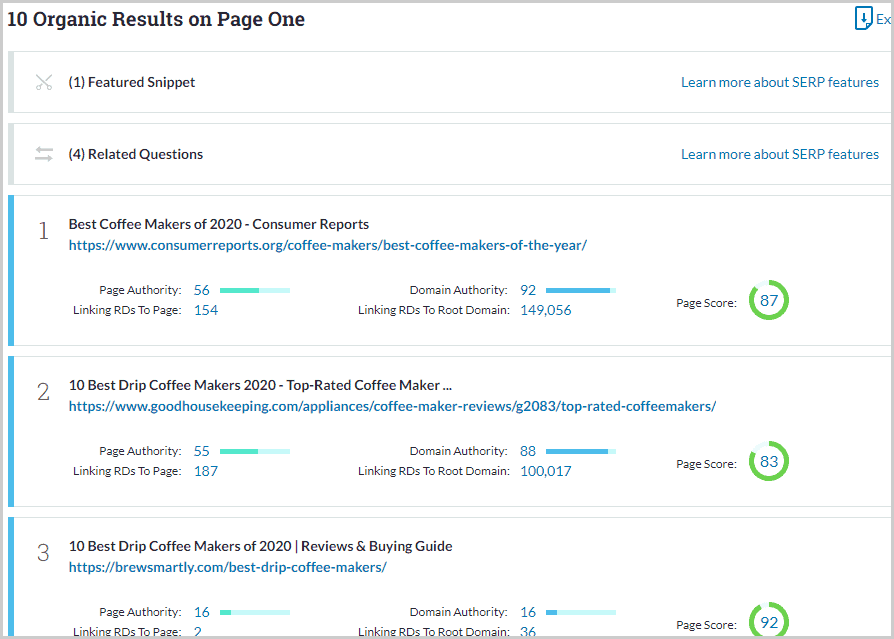
- The top 10 organic results for my keyword.
- DA: Domain Authority
- PA: Page Authority
- Linking RDs to page: Backlinks (from unique RDs) to the specific URL.
- Linking RDs to root domain.
- No. of SERP features and ads.
- Page score: An overall on-page score of the page.
MOZ is my favourite because its DA/PA metrics are arguably the closest to Google’s algorithms.
It’s even used by other SEO tools to measure a domain’s strength!
Competition Analysis
Enter 3 competing domains, and get comparative results.
Well yes, that’s an additional feature that Moz offers.
Here’s what the results look like:
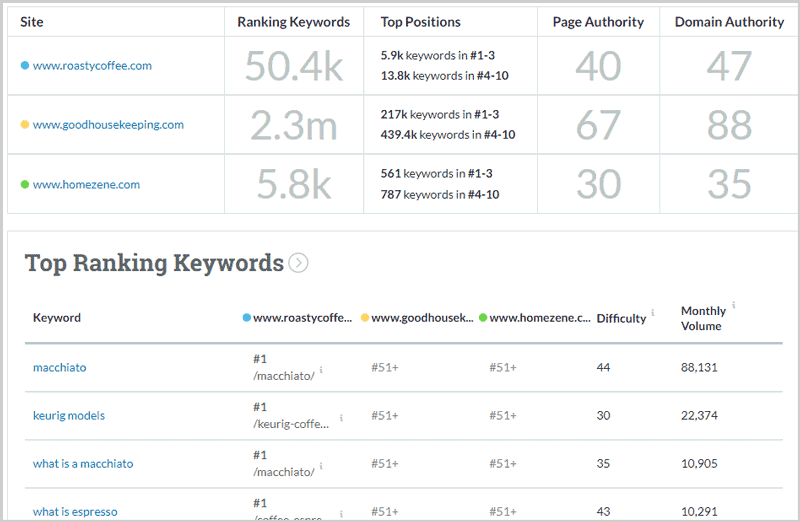
They include:
- Total number of ranking keywords.
- Keywords ranking in 1-4 and 4-10 positions.
- DA and PA of the domains.
- Top ranking keywords for the domains, their difficulty and volume.
Find the “Ranking Keywords” link on the feature-list (left-sidebar) and Moz will bring you additional data.
This will show you the number of “shared keywords” between these competing domains.
You can also click on the “Site overview” link on the left-sidebar.
This will offer you site-specific data. Meaning, the total ranking keywords on the domain, its DA/PA, volume and difficulty of the top keywords etc.
It too allows list-creation. The total volume, difficulty, CTR, priority etc. of all the keywords is then displayed as a total.
Moz even has a free plan, give it a try maybe?
5. KWFinder
Website: https://www.kwfinder.com
One-page results, no navigation to other pages and extremely pin-pointed data.
This is what defines KWFinder best.
Here’s what its results-page looks like:
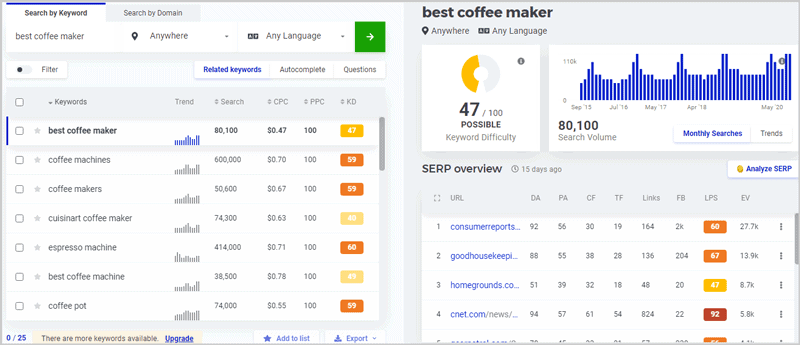
As is evident, for my seed keyword, it instantly generated hundreds of:
- Related keywords
- Autocomplete keywords
- And question keywords.
And, for each keyword, I get:
- Search volume
- CPC
- PPC Competition
- Difficulty
(If you hover over the KD, it’ll tell you when was the KD last calculated).
On the right-sidebar, detailed data for selected keywords (the one you’ve selected on the left-pane) is shown.
In pretty graphic and interesting visuals, the following is displayed:
- Keyword Difficulty
- Search-volume (and time-based graph).
The second-half of the right-pane includes the SERP Overview.
These are the top 10 domains currently ranking for my seed keyword.
For each domain, the following data is displayed:
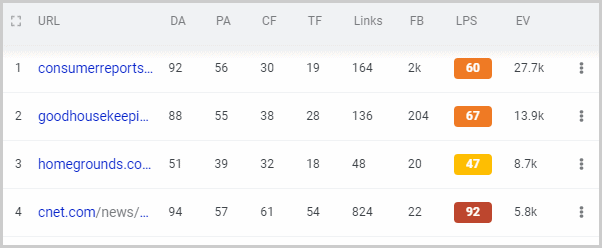
- DA: Domain Authority by Moz.
- PA: Page authority (again, by Moz).
- CF (Citation Flow)– Shows strength based on no. of links. Developed by Majestic.
- TF (Trust Flow)– Shows strength based on “quality” of links.
- LPS (Link Profile Strength): It shows the overall strength of the site’s link-profile.
- EV (Estimated visits): Basically shows the traffic for this keyword to each domain.
You can add keywords to a list simply by clicking on the “star” icon next to a keyword. (Truly as easy as that).
The list displays the combined average search volume, CPC, difficulty and paid competition for all the keywords in my list.
Search by domain
I use this for searching keywords on competitors’ domains.
This shows me the top keywords for the entered domain (with a lot of additional data, ofcourse).
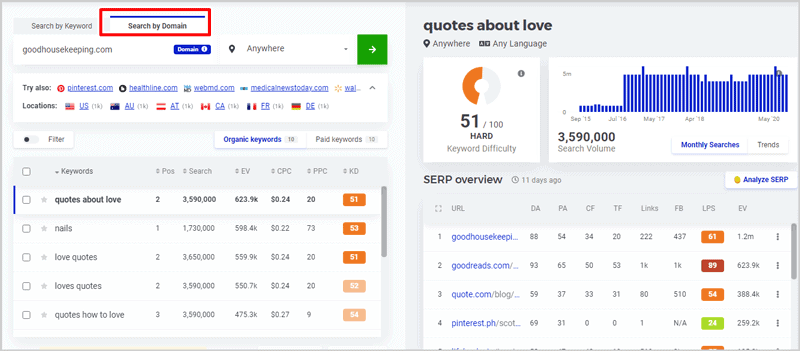
As is evident, it shows:
- SERP positions for the keywords.
- EV: Traffic/month.
- CPC
- PPC
- And KD (Keyword Difficulty).
Guess what, it even includes paid keywords!
Well yes, if and when paid keywords are detected, it shows them in a different tab as well.
Advanced search-filters
Let’s say you know exactly what you’re searching for.
If you know the number of avg. search volume you wish to target, the difficulty you can go for, or the CPC you need, KWFinder makes things even easier for you.
Here’s the search-filter that it presents:
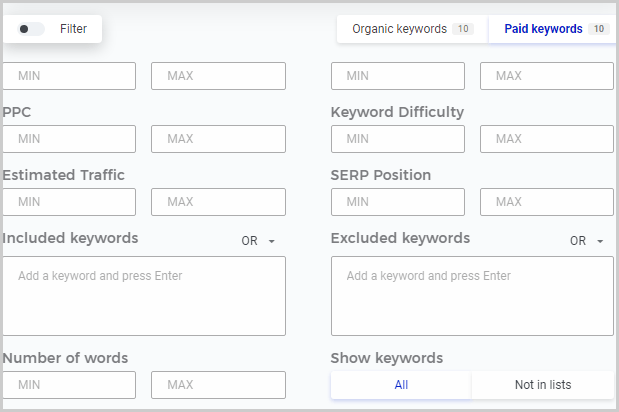
You can literally specify everything. Be it the estimated traffic, PPC, volume and everything in between.
Once applied, only the keywords matching your criteria are shown.
I must say, the interface at KWFinder is exceedingly impressive (and the simplest).
It doesn’t confuse me. Doesn’t require me to use different links. I don’t even need to visit any other page.
This one page displays all the data, for all the keywords.
If you need an “easy to use Keyword research tool”, this is just for you.
Get a 100% free trial plan, with 25 keyword searches/day!
6. Spyfu
Website: https://www.spyfu.com/
Getting that James Bond vibe yet?
Well yes, Spyfu is primarily focused towards spying on competitors.
And well, it’s detailed, and I mean, really detailed. The data at times is overwhelming!
Moreover, if “Paid ads” are what interest you, you’ll love Spyfu. (It’s a pretty advanced Adwords ad spy tool).
Your very first keyword search will get you something like this:
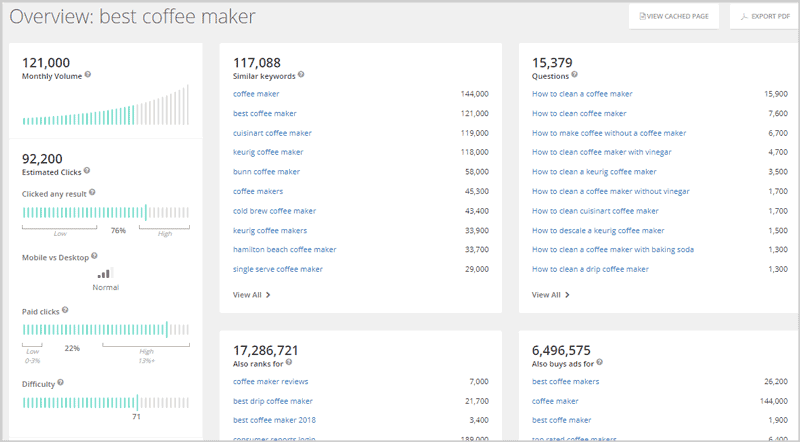
(It’s a very long page, the screenshot only captures around 40% of it).
Anyway, the displayed data includes :
- Monthly volume
- Estimated clicks (both organic and paid)
- % of clicked results.
- Mobile vs. Desktop traffic source.
- Paid clicks: The percentage of “ads” which get clicked.
- Difficulty
- Google provided data (CPC /monthly cost/ search volume)
- No. of new advertisers in the past 3 months.
- SERP features.
Let’s be honest, that’s data in the SEMrush and Ahrefs league, isn’t it?
Then, it offers keyword ideas. These include:
- Similar keywords : These aren’t exactly LSIs, rather, just “similar” keywords.
- Questions
- Also rank for: The top domains for your seed keyword also rank for these domains.
- Also buy ads for: The top domains for your seed keyword buy ads for these keywords.
I get it, that’s enough data for a keyword already.
But, Spyfu isn’t done yet.
Paid Keyword Data
Scrolling down on the same page, you’d see “Top Adwords buy recommendations”.
This data is still based on the seed keyword you entered.
These are keywords that the top-ranking domains run ads on.
The estimated impressions/month are shown as well.
And then there’s a list of the “Most successful Advertisers and their ads”.
The list shows:
- The monthly budget of the advertisers.
- Total keywords.
- Ad position
- Coverage
- And Ad-copy.
The Ad-copy is the most impressive.
It shows the exact ad (and the keywords) being used for the Ad. Even the different versions of the ad-copy (when available) are shown.
At the bottom of the page, there also is a list of the “Current Ads” for the keyword you entered.
All in all, it’s one of the very few best keyword research tools which pay serious attention to paid keyword data and not just organic.
PPC Research
This is a complete feature by itself that Spyfu offers.
Simply enter a competitors’ domain and it shows you:
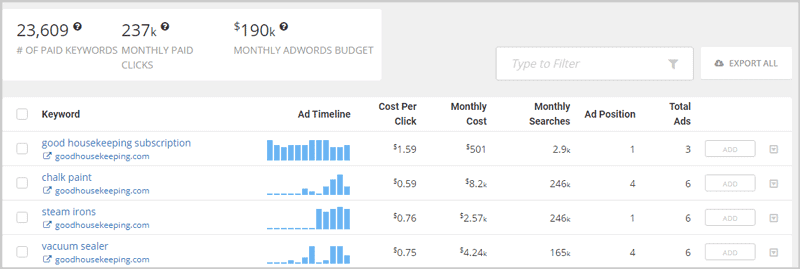
- No. of paid keywords on the domain.
- Clicks the site gets in a month from its ads.
- Adwords budget.
- Ad Keywords.
- Ad timeline
- CPC
- Monthly cost (for each keyword).
- Monthly searches
- No. of total ads for the keyword.
Hey, what if you’ve specific competitors you wish to analyse?
Well, Spyfu does offer a domain-specific keyword search.
Competitor Research
Put simply, you enter a domain in the “SEO Keywords” feature and Spyfu gets you the:
- Top keywords for the domain.
- CPC
- Difficulty
- Searches
- Clicks/month
- Click value/month.
No rocket-science.
It’s just a neat list which shows what’s performing best for a domain.
How you use that to your benefit? Well, that’s just your strategy and creativity.
Additionally, there’s also a “Competition research” feature.
When you enter your (or any) domain in the search-bar, a list of organic competitors is generated.
You then get to see the number of common keywords, no. of total keywords, monthly clicks and monthly click-value for each of these competitors.
What if you need the “exclusive” keywords?
Well, simply click on the keyword data from the “shared keyword” list. The next page will list all the shared, as well as unique keywords to both the domains.
Bottomline? Going by the level of details, it’s clearly one of the best keyword research tools, isn’t it?
7. Keysearch
Website: https://www.keysearch.co/
As the name suggests, it’s totally a SEO keyword research tool.
It’s newer, less-popular and even has a smaller database as compared to SEMrush, Ahrefs or Serpstat.
But, it does deserve a mention as one of the best keyword research tools.
So, a keyword search shows me the following information:
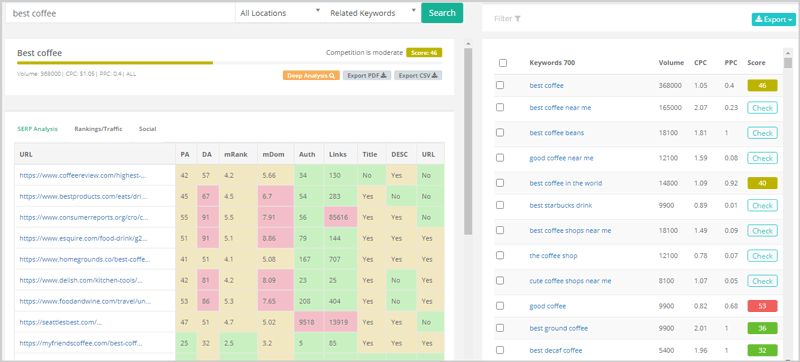
- Search volume
- CPC
- PPC
- Competition
- SERP Analysis
- Related keywords (on the right-pane).
The same information is also available for each related keyword shown on the right-pane.
See those top 10 URLs? By default it shows domain-stats (DA/PA/ Title etc.)
Well, we need the “keyword metrics” right?
I simply click on the “rankings/traffic” tab, and here’s what it provide me:
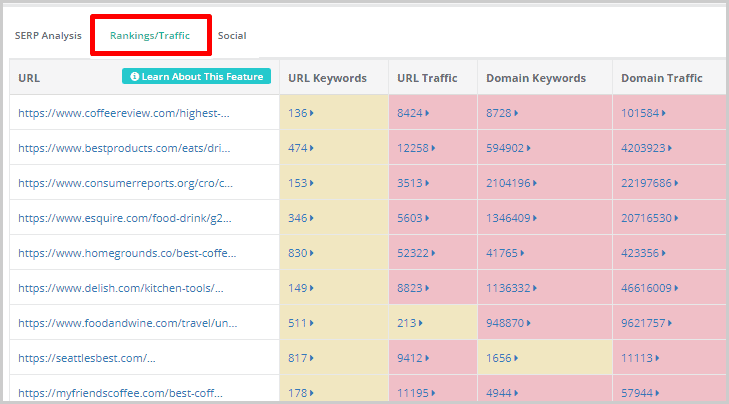
So, I get:
- URL Keywords: No. of keywords ranking in Google from each URL.
- URL Traffic: The amount of traffic each URL is getting from Google.
- Domain keywords: The total keywords on the entire domain. (Can be used to find keywords you may have otherwise missed).
- Domain traffic: Total traffic on the domain.
Need more data?
Simply click on the metric which you wish to expand.
E.g. I click on “URL Keywords” and it shows me all the keywords related to my seed keyword.
Now, I get the keyword’s position, search-volume, traffic, CPC and the URL.
There is also another tool on Keysearch called “Organic research”.
It lets you enter a domain, and then displays all the organic keywords for that domain.
Obviously, volume, traffic, CPC and other data is displayed for all these keywords.
Competition Analysis
Let’s see which keywords your competitors have but you don’t?
Keysearch lets you compare 3 competitor sites vs. your site.
It simply displays the keywords which you lack, but your competitors don’t. No confusion or overlaps.
The volume, CPC and the keyword list is displayed. Pretty simple.
In a nutshell? Without doubt is one of the best keyword research tools if not the best tool.
8. SEO Powersuite
Website: https://www.link-assistant.com/
SEOPowersuite isn’t a “web-based” tool.
Rather, it’s a suite of offline, downloadable software.
Its “Rank tracker” module is what lets me find some pretty profitable keywords.
Let’s start with its “Keyword Planner” feature.
It pulls data from Google Ads Keyword Planner.
I enter my keyword, and here’s what I get in return:

- The number of searches.
- Expected visits
- Competition
- CPC
- And Difficulty.
Because it’s pulled from Google Ads planner, the “competition”metric is pretty vague, and honestly? Not of much use.
However, the other data without doubt is the most “accurate”.
I do hope you notice the list of related keywords that I get?
It has another “Related Searches” feature. It shows me additional keywords related to my keyword which can be targeted.
Similarly, a “Related Questions” feature lets me find question-keywords.
Keyword Gap
Alike SEMrush, or Ahrefs, SEO Powersuite too has a Keyword gap feature.
Yes, you’re right (I do read minds), it too lets me compare competition, and find gaps in keywords.
You get to manually select the mode, the available options include:
- Your keywords: Unique only to you (or your domain).
- Common keywords.
- Competitor keywords: What I use most, shows the keywords I don’t have.
- All keywords.
A total of 5 competitors can be added.
For each keyword, you get:
- The keywords you’re missing (If you selected that mode).
- Position of each domain for the keyword.
- Competition
- CPC
- And Difficulty.
Its “Ranking Keywords” feature too can be used for competition research.
You enter a domain, and it gets you the top keywords for the domain and metrics related to the same.
Spy on your competitors’ keywords?
My only issue with SEO Powersuite? Being a “software” it requires quite a few seconds to display results.
But hey, it’s still one of the best keyword research tools, else, it wouldn’t make it onto this list.
9. Jaaxy
Website: https://www.jaaxy.com
Jaaxy claims to be the “World’s most advanced keyword research tool”.
Well, that’s debatable.
But, it does qualify as one of the best keyword research tools 2021 though.
Once I search for a keyword, here’s what it shows:
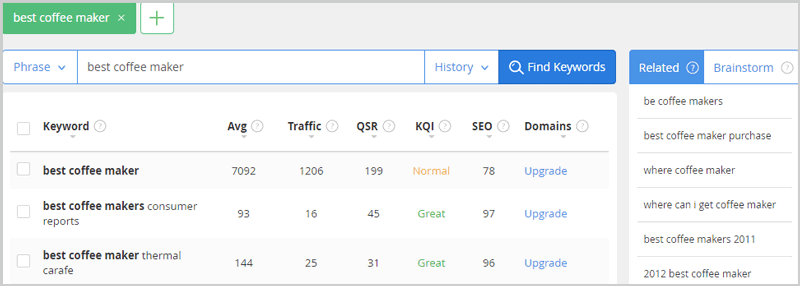
It provides the basics:
- Search volume
- Traffic (expected for first-page results for the keyword).
But, its advanced, exclusive metrics are what make it one of the best keyword research tools:
- QSR (Quoted Search Results): It’s the no. of websites trying to rank for the keyword.
- KQI (Keyword Quality Indicator): Tells you how “good” the keyword’s quality is. Any keyword in “green” is worth pursuing.
- SEO: This is a combination of “traffic and competition”. Basically, the higher this number, the easier it is to rank for the keyword.
On the right-panel, you do see:
- Related
- And Brainstorm tabs.
Don’t you?
Well, they provide me additional keywords, as simple as that.
“Alphabet Soup” is one creative feature that Jaaxy offers.
So you select an alphabet, let’s say “j”.
It’ll bring up a list of “your keyword + J” keywords.
E.g. for my keyword “best coffee maker” + J, it got me “JSP best coffee maker” and “Jacksonville coffee maker”.
I can’t truly say it’ll change your SEO game, but well, it’s still an unique feature no other best keyword research tools offer, right?
Domain keyword data
Enter a domain, get the keywords, as simple as that.
For each search, you get:
- Number of searches for a keyword.
- Expected traffic after first-page rankings.
- QSR
- KQI
- SEO
Beware though, this data isn’t domain-specific.
Meaning, the traffic or no. of searches doesn’t mean the traffic that the domain is currently getting.
Rather, it means the overall traffic potential of the keyword, in general, for any domain.
Frequently Asked Questions
Let’s clear some doubts eh?
What is the best keyword research tool?
After years of using it, I’d say SEMrush.
Not just for keyword research, but it’s a complete SEO and marketing suite.
Just in case you didn’t like SEMrush (seriously?) you can try Serpstat.
Serpstat is simpler, cheaper yet sufficiently data rich.
Is SEMrush free?
Yes, You can get SEMrush free for 14 days.
Can I get region and device-specific keyword data?
Yes, you can. Nearly all the best keyword research tools mentioned above let you select a country and device for your searches.
Final Words- Best Keyword Research Tools
Those were 9 SEO keywords tools for you folks.
I doubt you’ll need more than the first 3 options at best.
However, each of these have their own pros and cons.
But at the end, your personal factors will always decide the best tool for you.
Do you need organic data? Maybe you rely on paid ads more? Is “competition research” your focus? And obviously, the budget!
Just let me know which of these you feel is the best keyword research tool in your opinion, would you?


Google Keyword Planner is the best tool for keyword research. But can you please tell me how to use it for best results? Thank you.
Hi Jyoti,
Great Post about keyword research. It shows how much deep knowledge you have about blogging and keyword research and it seems that you have tried all tools.
I have tried all available free tools along with a LongTailPro Paid version which I am using from past 1 year. I would like to add a few things about LongTailPro from my personal experience that it’s truly a well managed one stop solution for keyword research as it gets updated regularly.
Hi Jyoti,
I am already familier with most of these keyword research tools.
Keyword.io, AnswerthePublic and Market samurai are the three that I haven’t tried yet. Will definitely going to test.
I have a question.
If any one want to go with pro keyword research tool then which one will you recommend.
By the way nice informarmation and thanks for sharing.
The most important part of this article is you include the cons also.
Cheers
Hi!
Thanks for sharing these keyword research tools with complete details. Surly it will help out many freshers.
Which of the keyword research tool you used personally?
Hi jyoti, you mentioned all the great keyword research tools available. i am using long tail pro from last 1 year and its really amazing.
Great list of keyword research tools… We utilize many of them in our strategies along with various trending tools. Definitely worth bookmarking this list and continue to search further. SEObook and Wordstream are two that didn’t make your list yet quite popular.
Hi Jyoti
Thanks for sharing these keyword research tools with complete details. Surly it will help out many freshers.
Which of the keyword research tool you used personally?
Hey Jyoti Mam,
Very complete guide to keyword Research seo Tools . We always talk about SEO but we tend to forget SEO. These are a great list of ideas. All good tips and if followed and done properly and consistently then perhaps the company information about seo portland oregon. I agree with this completely, the goal of linking isn’t just SEO rankings
I am following your blog over 4 months! Keep up the good work.
Thanks for sharing your knowledge. 🙂 very helpful!
Happy Blogging 🙂
This is an awesome resource shared here jyoti. I think Keyword.io is one of the best free tool and SEMRUSH is the best premium tool for finding keywords. Thanks for creating this keyword tools here.
Thanks for the great article.
I am personally use semrush in one of my website and i must say it is a great tool for seo optimization.
Indeed a great post about keyword research tools.
Keyword research is the best way to find the right opportunity to work on and earn some decent amount of income.
It is true that without targetting the right keyword, We can’t achieve success because we don’t know that which keyword has great potential so to know this, keyword research comes into action.
I am using Google Keyword Planner and Long Tail Pro for my keyword research work. Thanks for sharing such a nice list of keyword research tools. 😀
Hi Jyoti,
Thank you for sharing such awesome tools with us. This is really very important to research about the best keywords before writing an article. Keywords suggestion tools help us to understand what people are looking for and we can serve their need accordingly. This is the best way to increase your traffic also.
I have tried Google Keyword planner and Keyword.io and these two tools are awesome.
Overall, a very nice and useful article. Thank you for sharing it.
Hi Jyoti,
Very useful list for finding keyword search. I was using only google. But these other tools are also friendly.
Thanks
Hi Jyothi,
you explained in detail about pros and cons of every tool making me opt for best tool easily. I don’t know about some tools till now. This list is really helpful for all new bloggers.
Thanks.
its usefull information provided by u Jyoti. keyword are the heart of seo and in blogging keywords are so important to get high ranking position in search engines like google
Thank you. You have introduced amazing list of keywords tools in this article. Which one is best in your experience? Would you like to share with us 🙂
Thanks for sharing these tools Jyoti! But I was wondering do you use any LSI tools? which one is your favorite?